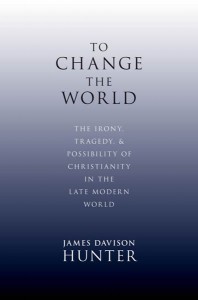As part of his Doctor of Ministry (DMin) in Ministry to Emerging Generations (Gordon-Conwell Theological Seminary), Tom’s written a number of book responses and given several short presentations (personal and group). In this series he not only “shares the wealth,” but also looks forward to your feedback as he refines his project: An argument for vocational discernment for graduate studies in the context of InterVarsity Christian Fellowship (Stay tuned to learn more!). Earlier posts on the program: Ministry to Emerging Generations and The Big Picture of Ministry to Emerging Generations.
To Change the World: The Irony, Tragedy, and Possibility of Christianity in the Late Modern World

Over the past several years James Davison Hunter’s To Change the World: The Irony, Tragedy, and Possibility of Christianity in the Late Modern World (New York, NY: Oxford University Press, 2010), in particular his application of Jeremiah 29:4-7 to engaging the world (276-279), has been of significant influence in InterVarsity’s Faculty Ministry. To Change the World has been hailed as “a seminal book on cultural formation and change, particularly insightful on how Christians (primarily evangelical) have understood and misunderstood culture change over the past 40 years or so” (Micheal Hickerson. Changing the World with James Davison Hunter. Emerging Scholars Network Blog, 8/2/2010). I concur with Hunter:
the antidote to [the culture war’s] “seizing power” in a new way is a better understanding of faithful presence. . . . A theology of faithful presence means a recognition that the vocation of the church is to bear witness to and to be the embodiment of the coming Kingdom of God. To paraphrase St. Paul at the end of his letter to the Galatians, “what matters is the new creation” (Gal. 6:15) (95).
It is hard to stop quoting James Davison Hunter as he unpacks “the kingdom of God . . . a different people and an alternative culture that is, nevertheless, integrated within the present culture . . . networks (and more, communities) of counter leaders operating within the upper echelons of cultural production and social life generally” . . . renewing the church and engaging the culture (96). May it be so!
“Chapter Four: Toward a Theology of Faithful Presence” offers a framework for next steps:
First, faithful presence means that we are to be fully present to each other within the community of faith and fully present to those who are not (244).
Second, faithful presence requires that Christians be fully present and committed to their tasks (246).
Third, faithful presence in the world means that Christians are fully present and committed in their spheres of social influence, whatever they may be: their families, neighborhoods, voluntary activities, and places of work (247).
Thus, when the Word of life is enacted within the whole body of Christ in all of its members through an engagement that is individual, corporate, and institutional, not only does the word become flesh, but an entire lexicon and grammar becomes flesh in a living narrative that unfolds in the body of Christ; a narrative that points to God’s redemptive purposes. It is authentic because it is enacted and finally persuasive because it reflects and reveals the shalom of God.
Within InterVarsity we have had significant conversation regarding the relationship of the visions offered by Andy Crouch’s Culture Making: Recovering Our Creative Calling (Downers Grove, IL: InterVarsity Press, 2008) and James K. A. Smith’s Desiring the Kingdom: Worship, Worldview, and Cultural Formation (Grand Rapids, MI: Baker Academic, 2009). Our greatest concerns regarding Hunter has been the lack of acknowledgement of local witness. This extends beyond or alongside politics not only with Mennonite Central Committee (MCC) in the Anabaptist country where I live (i.e., Lancaster County, PA), but also in focused ministries (e.g., campus ministry, urban ministry). Lord willing, a more focused and “exilic” local witness will lead “Toward a New City Commons.”
To God be the glory!
Tom enjoys daily conversations regarding living out the Biblical Story with his wife Theresa and their four girls, around the block, at Elizabethtown Brethren in Christ Church (where he teaches adult electives and co-leads a small group), among healthcare professionals as the Northeast Regional Director for the Christian Medical & Dental Associations (CMDA), and in higher ed as a volunteer with the Emerging Scholars Network (ESN). For a number of years, the Christian Medical Society / CMDA at Penn State College of Medicine was the hub of his ministry with CMDA. Note: Tom served with InterVarsity Christian Fellowship / USA for 20+ years, including 6+ years as the Associate Director of ESN. He has written for the ESN blog from its launch in August 2008. He has studied Biology (B.S.), Higher Education (M.A.), Spiritual Direction (Certificate), Spiritual Formation (M.A.R.), Ministry to Emerging Generations (D.Min.). To God be the glory!

Leave a Reply